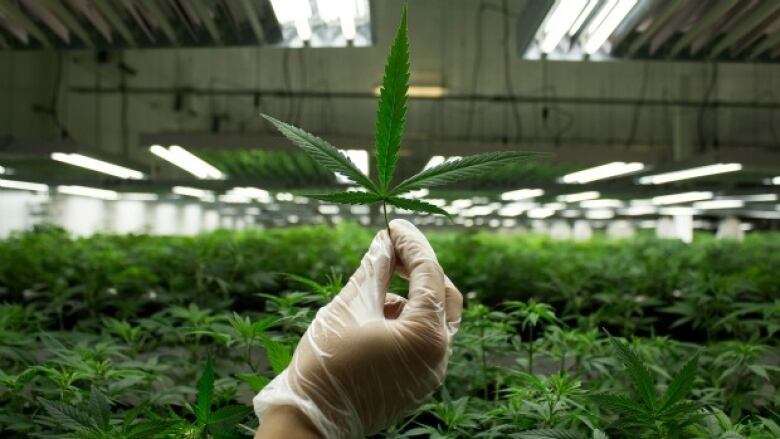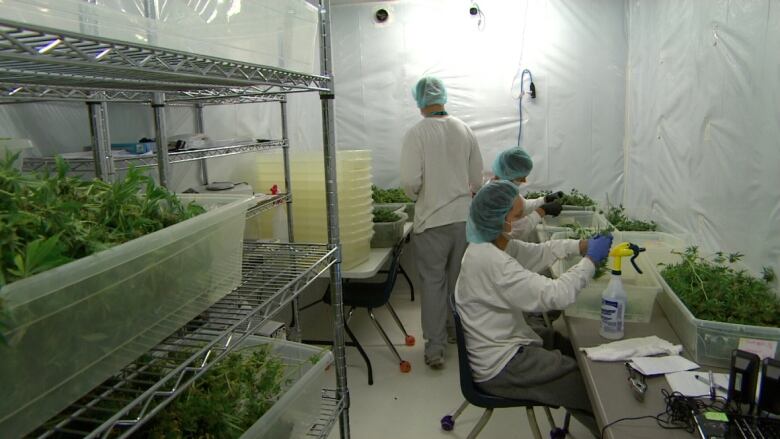Haze around legalized pot sales becomes clearer today
Companies eye opportunities as government gives details on growing and selling marijuana

Fortunes could be made or lost with the decisions on pot revealedtoday by Manitoba'sProgressive Conservative government.
Those already with a stake in Manitoba's cannabis industry producers, vape shop owners and First Nations are counting on the province to allow private retailers to sell recreational marijuana.
Premier BrianPallisterhas signaled it will be a some type of a "hybrid" system that involved the private sector, but was tight-lipped on some of the specific details.
The government will frame its policy today to allow companies to respond to requests for proposals onthe legal trade of marijuana set to start July 1next year. The province has already concluded a round of expressionof interest requests from various stakeholders.
Some companies have major money on the table.
Winnipeg-based producer Delta 9is hoping to be at the forefront of distribution and retailin Manitoba. The company is Manitoba's only producer licensed to sell medical cannabis.
Last weekit wentpublic on the TSX Venture stock exchange as it gears up to expand production ahead of legalization. CEO John Arbuthnot said the money raised will allow Delta 9 to up production from 1,000 kilos per year to 17,000 kilos.

He would like to see Delta 9 storefronts selling recreational cannabis in the near future.
VapeHaven and Hemp Haven owner JeremyLoewen, one of Manitoba's smaller players,is hopeful the government will provide a "level playing field" for those who want to open pot dispensaries.
"Private enterprise is the way to go. You've got to give everybody an equal playing field,"Loewen said.
He doesn't want to see Manitoba Liquior and Lotteries in charge.
"That's just a joke. That's just the government controlling everything."
Loewen would like to see independent dispensaries,similar to Vancouver's medical cannabis model.
- Cannabis industry to province: Make room for made-in-Manitoba weed
- Manitobans eye opportunity in marijuana legalization
One detail Pallisterdid reveal about the plan on Monday was thathis government would not follow the lead of Ontario, where the government plans to open stand-alone stores operated by theLiquor Control Board of Ontario.
Indigenous investment in marijuana
Chief ChristianSinclairofOpaskwayakCree Nation also wants to see a private sector approach to allow First Nations to participate.
His community, about 530 kilometres northwest of Winnipeg, has purchased $3 million worth approximately 10 per cent of shares in National Access Cannabis. The publicly traded companyoperates 10 medical marijuana clinics in cities across Canada, including one in downtown Winnipeg.

Sinclairsaid he would like the province to "allow for us to be able to build out and operate these facilities on First Nations as well as urban environments."
He sees it as a way to tackle poverty and said he is in talks with a number ofManitoba First Nations who want to participate in opening National Access Cannabis dispensaries.
Meanwhile, a spokesperson for Bonify, a Winnipeg-based and Health Canada-approved producer of medical cannabis, said that company plans to work within whatever distribution framework the province decides on. The company is currently working "very closely" with regulators towarda sales licence, the spokesperson added.
Plenty of questions to be answered
The Canadian Federation of Independent Business has been monitoring the move to legalization closely.
The head of the CFIB's Manitoba office says an ongoingsurvey among its members has already drawn more than 200 responses, with close to60 per cent wanting to see some form of private participation in the sale of marijuana.
Jonathan Alward said a further 25 per cent of respondents want to see the public sector take the lead in distributing marijuana, while approximately15 per cent were undecided.
Alward said the results demonstrate there are still many questions for the governmentto answer.
"A lot don't know what a retail sector might involve. Even if you look at B.C., the way the conversation has turned a lot, now it's almost commonly accepted there that you are going to have retail sales, but what does that mean for all the spinoffs, If you look at edibles, oils, things like that," Alward said.
Canada's pot sales system could have many strains
Most provinces and territories are still fine-tuning the details of the sale and use of recreational marijuana and it's likely to vary across the country.
In British Columbia, the distribution model could even vary across the province. Vancouver and Victoria have brought in laws in recent years to license and regulate the numerous medical marijuana storefronts but Public Safety Minister Mike Farnworth said B.C. may not take a "one-size fits all approach".
Ontario unveiled its cannabis framework earlier this fall, which includes roughly 150 stand-alone stores and an online ordering service all overseen by the Liquor Control Board of Ontario. Similar to online alcohol sales, cannabis sales will require ID checks and signatures upon delivery.
- B.C. to begin public consultation on marijuana legalization
- Ontario unveils pot plan, including online ordering, 150 stand-alone stores
Alberta announced cannabis will be sold in specialty stores, separate from alcohol, tobacco and pharmaceuticals. It remains undecided whether the stores will be government run or privately operated.
Pot better in government hands: union
One voice in Manitoba for a strictly government-controlled distribution system is theManitoba Government and General Employees' Union.
Union president Michelle Gawronsky said the one way to ensure thesafe sale of the product is through stand-alone stores operated by Manitoba Liquor and Lotteries staff.
"We need the government to be socially responsible for how this product is sold in Manitoba. They've got the perfect example, which is the MLL, so don't reinvent the wheel," Gawronsky says.
Another advantage, Gawronsky said, is by controlling the sale and distribution of weed, the government stands to reap the greatest financial benefit, once it's paid the up front costs of establishing a network of locations to sell the products.
Manitoba Liquor and Lotteries responded to the government's call for a request for expressions of interest in September, but an MLLspokesperson would not elaborate.












_(720p).jpg)


 OFFICIAL HD MUSIC VIDEO.jpg)
.jpg)



























































































